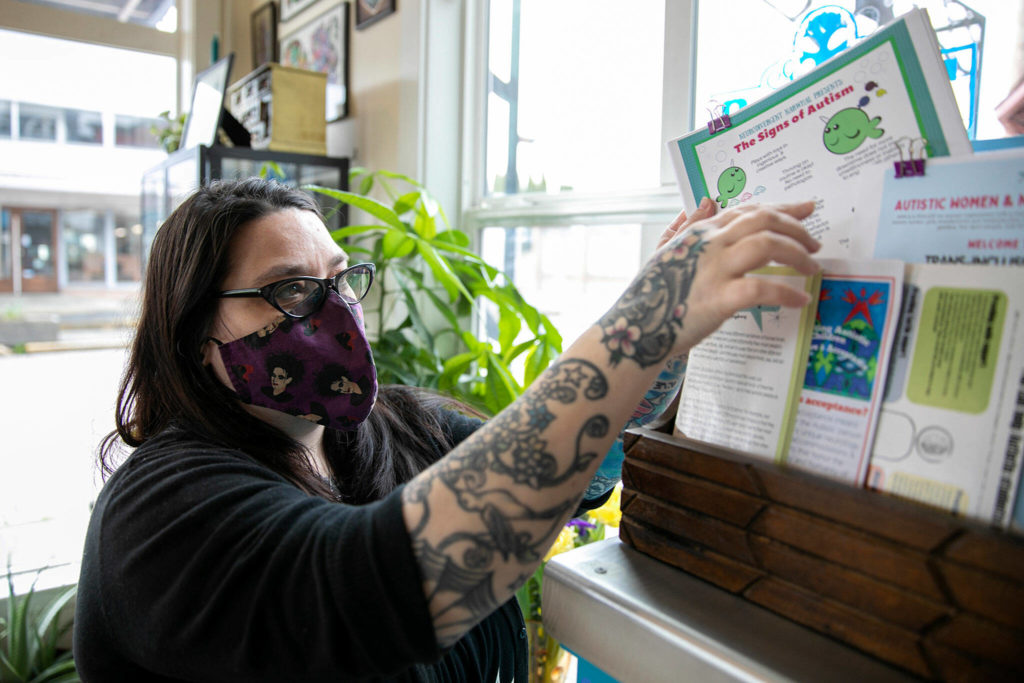STANWOOD — At Stanwood Tattoo Company, locals can book an appointment to get inked, or to sit down and chat with autistic activist Lei Wiley-Mydske.
Tucked away in the chic and buzzing tattoo parlor is Wiley-Mydske’s autism acceptance library — a sky blue cabinet filled with anthologies, resources and picture books by autistic authors and scholars.
When the collection started in 2014, it was the first of its kind, Wiley-Mydske said. Now, she’s helping other neurodivergent activists start their own little libraries around the globe.
“I remember when I would say that word: neurodiversity,” she told The Daily Herald. “And people would say, ‘Did you just make that up?’”
The library in Stanwood features Wiley-Mydske’s iconic “neurodivergent narwhals.” The cheery cartoons have become a mascot of sorts for her self-published infographics about autism. One fan even has a neurodivergent narwhal tattoo now.
The Stanwood mom and tattoo shop co-owner started the project, in part, because she couldn’t find autistic authors at the local public library.
Residents can come to the shop and find books like “Sincerely, Your Autistic Child: What People on the Autism Spectrum Wish Their Parents Knew About Growing Up, Acceptance and Identity.” Wiley-Mydske contributed to the collection of essays by autistic writers.
You can borrow “Typed Words, Loud Voices,” an anthology by non-verbal authors and artists.
There’s also “Spectrums: Autistic Transgender People in Their Own Words,” compiled by trans autistic author and artist Max Sparrow.
Wiley-Mydske didn’t know she was autistic until her child, then 4 years old, was diagnosed. Studies show autistic women and people of color are more likely to be undiagnosed, or diagnosed later in life.
“I was like, ‘Oh, well I don’t understand why everybody thinks that my kid is autistic, because they act just like me,” she said. They both played the same way, for example, finding joy in lining up toys. “And I find that it’s really common for autistic women to find out they’re autistic because of their kids.”
At support groups for parents of autistic children, Wiley-Mydske felt isolated. She described the largely non-autistic group focusing on how to “fix” their autistic children, or conform their behavior to be socially acceptable. She was introduced to “planned ignoring,” and told to ignore her then-non-verbal child in an attempt to encourage speech.
“Even just pointing, why would I ignore that? It’s communication, even if other people might not want to recognize it,” she said. “I almost wanted to cry the way people were talking about their kids. … I wanted people to recognize my child’s humanity.”
After finding groups like Parenting Autistic Children with Love and Acceptance, as well as the Autistic Women and Nonbinary Network, which helps fund the library, Wiley-Mydske created the narwhals.
They debuted in classroom posters that Wiley-Mydske created in response to infographics circulating on social media that described certain autistic behaviors as abnormal and negative.
One original graphic, titled “the signs of autism,” features a red-haired boy with “poor speech or lack of speech.”
In Wiley-Mydske’s version, a happy green narwhal “communicates in unexpected ways.”
“Listen,” the poster reads. “Talking is not the only way to ‘speak.’”
The young boy organizes toys by color, described as “inappropriate playing.”
Wiley-Mydske replaces the boy with a narwhal who “plays with toys in ingenious and creative ways.”
Instead of a crying boy described as “oversensitive” to sound, a narwhal wearing headphones explains, “The world can be a loud and overwhelming place for autistic people. Sensory processing differences are not personality defects.”
Lots of other educational material, Wiley-Mydske recalled, urged young students to have “quiet hands,” or make eye contact to show they were listening — “things my child couldn’t do,” Wiley-Mydske said.
Without a diagnosis or proper supports in public school, her own experience in the ’90s was “miserable.”
Now, she’s passionate about inclusion in schools, where neurodivergent students aren’t segregated, lessons are taught “with the expectation that everyone can learn,” and autistic kids aren’t forced to prioritize learning social skills over academics.
“I’ve seen parents make it work, and it’s just beautiful. And I wish that for everyone. Because every kid deserves that,” she said. “That’s every child’s right.”
The library is hosting an event on the topic May 3. Disability rights activist Dr. Leah M. Kelley will present on “cultivating self advocacy and disability pride.”
As for Wiley-Mydske, she’s working on a neurodivergent narwhals children’s book.
“It’s about championing your child,” she said, “in a world that tells them they’re broken.”
Visit the library
Stanwood Tattoo Company is located at 10003 270th St. NW, Suite A.
For more information, visit neurodiversitylibrary.org or call 360-939-2223.
Claudia Yaw: 425-339-3449; claudia.yaw@heraldnet.com. Twitter: @yawclaudia.
Talk to us
> Give us your news tips.
> Send us a letter to the editor.
> More Herald contact information.


























